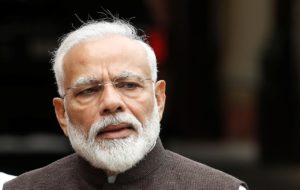Indian Democracy’s Tryst With Trust

To overcome voter fatigue with the same old political faces, the BJP has introduced a presidential form of election campaign which focuses on the image of Prime Minister Narendra Modi and urges voters even in state elections to vote for Modi and not for the local candidates
Indian democracy is at a crossroads. People are more invested in elections even as they become more sceptical about politicians and public representatives.
Increasingly, people seem to be voting more to remove a particular party from power rather than proactively choosing an alternative.
Voters feel that keeping a party in power for long does not yield results. Change is their way of creating pressure on elected governments to deliver. There is also, however, a curious pro-incumbency trend in some Indian states.
While there is an overall disenchantment with democratic outcomes, there still exists greater investment in the electoral processes.
India is thus among the few countries in the world witnessing a constant rise in voter turnout.
In 2023, there was a six-fold jump in voter turnout compared to the first general election of 1951. On an average, the voter turn-out is 67 percent in the general election and close to 70 percent in many of the recent state assembly elections.
In spite of male electors being greater in number, it is the women voters who are turning out to vote in larger numbers. Women voters have not only managed to have more women-oriented welfare policies implemented — such as free passes for women in public buses — but even managed to create positive pressure to implement a long standing demand for the implementation of 33 percent reservation for women in Parliament.
Does all of this mean there is greater voter trust in the Indian state and its governance? It does not seem so.
There is a steep rise in what is often referred to as anti-incumbency by psephologists, where political parties are often voted out to bring in a new party.
At the heart of this crisis of trust in democratic processes in India seems to be the “neoliberal consensus”. Such a consensus disallows parties to formulate radically different policies. Most political parties today promise transactional welfarism and electoral promises which are increasingly similar.
In order to overcome this kind of “trust deficit” and a sense of crisis of legitimacy, political parties develop innovative strategies to circumvent voter anger, without changing the direction of their policy outcomes.
The BJP, for example, has constantly changed its candidates and state level leadership.
In the recently concluded assembly elections, the BJP changed the chief ministerial candidates in Rajasthan, Madhya Pradesh and Chhattisgarh.
Even in course of the ongoing run up to the general elections, the BJP has dropped many sitting MPs. It was widely believed that Congress in Rajasthan and BRS in Telangana would have fared much better had they not used again the same set of legislators.
To overcome voter fatigue with the same old political faces, the BJP has also introduced a presidential form of election campaign.
It contests elections centred on the image of Prime Minister Narendra Modi and urges voters even in state elections to vote for Modi and not for the local candidates. The argument is that it is Modi who will finally deliver on the election promises.
The current campaign for general elections is not only spearheaded by Modi but centres around the slogan of “Modi’s Guarantee”.
In an era of faceless globalisation, complex tiers of governance and increasing informalisation of the economy, having a face and a name to rally around is meant to encourage the voters to repose greater trust in the leader and his governance.
This shift to a “direct democracy” form of electioneering underlines the trust deficit in governance, which is compensated by increased electoral participation. It is a paradoxical see-saw between trust and legitimacy crisis.
Modi, therefore, is accountable directly to the electorate. Constitutional norms, the separation of powers and Rule of Law become dispensable.
The discourse of efficiency has made the narrative of aspirational mobility and faster growth look more palpable and tangible.
Yet again, greater aspirational mobilisation — Atma Nirbhar Bharat (self-reliant India) — reinforces greater trust in and consent for a more centralised and authoritarian form of governance.
This could be called libertarian paternalism — a model of governance in which trust in institutions is actively undermined as against the trust in a leader.
Greater electoral participation, therefore, is a trust and investment in the electoral process without respect for democratic norms that can turn into a majoritarian ethic. In this model, democracy and authoritarianism become somewhat strange bedfellows.
The debate on Indian democracy today is thus eerily polarised.
The urban, educated sections of progressive social activists, academics, journalists and the opposition parties are worried about the growing crisis of democracy. They see the crisis reflected in the way institutions are weakened and norms are flouted, state governments are destabilised through defections and horse trading, the role of money power in politics goes up building huge entry barriers and hero-worship of the leader makes public discourse toxic.
They see these as signs of a growing democracy deficit.
However, most of these issues do not seem to concern the voters when they go out to cast their vote. For the voters, democracy seems to be about policy outcomes, welfare benefits and greater economic opportunities.
Neoliberal development creates a model of jobless growth and economic inequalities. This is what the voter responds to but finds that there are no alternatives. All parties speak the same language.
How then does the voter influence the parties to breach the neoliberal wall? It is this lingering question in a voter’s mind that will probably decide the changing contours of her trust in Indian democracy.
(Originally published under Creative Commons by 360info™. Read the original article here)





